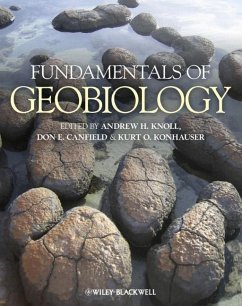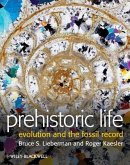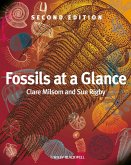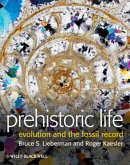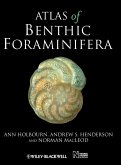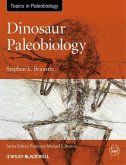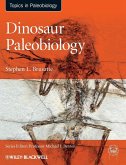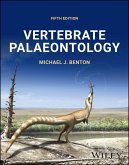Fundamentals of Geobiology
Herausgegeben von Knoll, Andrew H.; Canfield, Don E.; Konhauser, Kurt O.
Fundamentals of Geobiology
Herausgegeben von Knoll, Andrew H.; Canfield, Don E.; Konhauser, Kurt O.
- Broschiertes Buch
- Merkliste
- Auf die Merkliste
- Bewerten Bewerten
- Teilen
- Produkt teilen
- Produkterinnerung
- Produkterinnerung
For more than fifty years scientists have been concerned with the interrelationships of Earth and life. Over the past decade, however, geobiology, the name given to this interdisciplinary endeavour, has emerged as an exciting and rapidly expanding field, fuelled by advances in molecular phylogeny, a new microbial ecology made possible by the molecular revolution, increasingly sophisticated new techniques for imaging and determining chemical compositions of solids on nanometer scales, the development of non-traditional stable isotope analyses, Earth systems science and Earth system history, and…mehr
![Prehistoric Life Prehistoric Life]() Bruce S. LiebermanPrehistoric Life177,99 €
Bruce S. LiebermanPrehistoric Life177,99 €![Fossils at a Glance Fossils at a Glance]() Clare MilsomFossils at a Glance92,99 €
Clare MilsomFossils at a Glance92,99 €![Prehistoric Life Prehistoric Life]() Bruce S. LiebermanPrehistoric Life117,99 €
Bruce S. LiebermanPrehistoric Life117,99 €![Atlas of Benthic Foraminifera Atlas of Benthic Foraminifera]() Ann HolbournAtlas of Benthic Foraminifera235,99 €
Ann HolbournAtlas of Benthic Foraminifera235,99 €![Dinosaur Paleobiology Dinosaur Paleobiology]() Stephen L. BrusatteDinosaur Paleobiology155,99 €
Stephen L. BrusatteDinosaur Paleobiology155,99 €![Dinosaur Paleobiology Dinosaur Paleobiology]() Stephen L. BrusatteDinosaur Paleobiology104,99 €
Stephen L. BrusatteDinosaur Paleobiology104,99 €![Vertebrate Palaeontology Vertebrate Palaeontology]() Michael J. BentonVertebrate Palaeontology60,99 €
Michael J. BentonVertebrate Palaeontology60,99 €-
-
-
Geobiology has many faces: there is the microbial weathering of minerals, bacterial and skeletal biomineralization, the roles of autotrophic and heterotrophic metabolisms in elemental cycling, the redox history in the oceans and its relationship to evolution and the origin of life itself..
This book is the first to set out a coherent set of principles that underpin geobiology, and will act as a foundational text that will speed the dissemination of those principles. The chapters have been carefully chosen to provide intellectually rich but concise summaries of key topics, and each has been written by one or more of the leading scientists in that field..
Fundamentals of Geobiology is aimed at advanced undergraduates and graduates in the Earth and biological sciences, and to the growing number of scientists worldwide who have an interest in this burgeoning new discipline.
Additional resources for this book can be found at: http://www.wiley.com/go/knoll/geobiology.
- Produktdetails
- Verlag: Wiley & Sons
- 1. Auflage
- Seitenzahl: 456
- Erscheinungstermin: 29. Mai 2012
- Englisch
- Abmessung: 277mm x 220mm x 25mm
- Gewicht: 1365g
- ISBN-13: 9781405187527
- ISBN-10: 1405187522
- Artikelnr.: 35000948
- Verlag: Wiley & Sons
- 1. Auflage
- Seitenzahl: 456
- Erscheinungstermin: 29. Mai 2012
- Englisch
- Abmessung: 277mm x 220mm x 25mm
- Gewicht: 1365g
- ISBN-13: 9781405187527
- ISBN-10: 1405187522
- Artikelnr.: 35000948
much like the "geological periodic table" published recently. Geobiological Processes:. 2. The carbon cycle: biological loops
.
primary producers and controls on primary production.
marine.
global patterns.
primary contributors.
nutrient and trace element limitation.
CO2 limitation and carbon compensation mechanisms.
light and the deep chlorophyll maximum.
the microbial loop and the viral loop.
terrestrial.
global patterns.
water availability.
nutrient availability and access.
biological remineralization of organic molecules: respirers and other heterotrophs.
trophic levels.
export production.
electron acceptors and carbon mineralization.
secondary production and efficiency of energy utilization. 3. The carbon cycle: geological loops.
inorganic carbon ions and molecules: production and preservation.
controls on organic carbon preservation.
regeneration of carbon dioxide.
subduction, metamorphism.
weathering (both IC and OC).
ocean chemistry over Phanerozoic time.
pH.
calcite/aragonite oceans. . 4. The N cycle.
nitrogen as a biological molecule and nutrient.
N2 fixation.
biochemical aspects.
phylogenic aspects.
importance of and controls in the ocean.
importance of and controls on land.
Denitrification/Nitrate ammonification.
biochemical aspects.
phylogenetic aspects.
importance of and controls in the aquatic systems.
Nitrification and Anammox.
biochemical aspects.
phylogenetic aspects.
importance of and controls in aquatic systems.
summary of N cycle in the oceans (and on land?). 5. The S cycle.
S as a biological molecule and nutrient.
sulfate reduction.
biochemical aspects.
phylogenic aspects.
importance of and controls in aquatic systems.
sulfide oxidation.
nonphotosynthetic pathways.
photosynthetic pathways.
summary of S cycle in the oceans. 6. The Fe cycle.
Fe as a biological molecule and nutrient.
Fe reduction.
biochemical aspects.
phylogenic aspects.
Fe availability.
siderophores.
Pili.
importance of and controls in aquatic systems.
Fe oxidation.
non
phototrophic.
phototrophic.
A word about Mn. 7. The O cycle.
O2 production: photosynthesis.
coupled photosystems and function of the oxygen evolving apparatus
a few words on the evolution of oxygenic photosynthesis.
review of photosynthetic rates in ocean and on land.
distribution of O2 in the oceans.
O2 consumption.
oxygen respiration.
biochemistry.
phylogeny.
kinetics.
oxygen in marine sediments.
distribution.
importance in carbon mineralization.
reduced species oxidation.
weathering.
reactions.
kinetics.
oxygen control over geologic time. 8. Geobiology of P and trace nutrients.
Biological requirements for P, Mo, Cu, V, Zn and other trace nutrients.
Availability in the oceans: sources and sinks.
Phosphate remineralization under oxic and anoxic conditions.
Availability in soils.
Redox sensitivity of trace metals and its implications for bioavailability. 9. Bacterial biomineralization.
cell surface reactivity.
metal sorption, nucleation and crystal growth.
induced vs controlled pathways.
examples: Fe oxyhydroxides, carbonates, silica, pyrite. 10. Eukaryotic skeleton formation.
the functional biology and phylogenetic distribution of mineralized skeletons.
how organisms control mineralization.
CaCO3 skeletons: illustrated by E. huxleyi, echinoderms, bivalves.
Ca
phosphate skeletons: illustrated by humans.
SiO2 skeletons: illustrated by diatoms and sponges.
relevance to marine Si and Ca cycles. Link to C cycle?. 11. Plants and animals as geobiological agents.
a discussion of how plants and animals function as geobiological agents, going beyond skeleton formation to include the geobiological effects of roots, burrowing, etc.. 12. Weathering, erosion, and climate regulation: a geobiological view.
role of microbes (production of organic acids and CO2, chelators, endoliths).
carbonate
silicate weathering cycle and BLAG, including influence of plants on CO2.
DMS and climate.
methane and climate. . . How do we know what we think we know: Geobiological tools and applications. 13. Microbial geobiology: identifying the players and their metabolisms.
traditional methods of characterizing microorganisms.
molecular methods of identifying microorganisms.
SSU rRNA signatures.
Direct investigation of field samples.
Biases in amplification and ways of dealing with this.
FISH.
molecular phylogenies: construction, interpretation and caveats. (lateral transfer, alternative gene phylogenies).
bioenergetics (linking geochemistry to ATP generation; stable isotope probing). 14. Microbial geobiology; genomics and proteomics.
Genomics and the structure of microbial populations.
individual gene surveys.
Fosmid libraries.
environmental genomes.
mRNA.
environmental proteomics.
other?.
case studies. 15. Stable isotopes in geobiology.
Carbon isotope systematics.
carbon fixation (various pathways).
carbon remineralization.
methanogenesis.
N isotope systematics.
N fixation.
denitrification and anammox.
nitrification.
Sulfur isotope systematics.
sulfate reduction.
disproportionation.
sulfide oxidation.
minor isotopes and a few words on their systematics.
Oxygen isotopes.
photosynthesis.
respiration.
minor isotopes and the Dole effect.
Metal isotopes.
Fe.
Mo.
others. 16. Biomarker molecules in geobiology.
the biomarker principle.
environments and probabilities of molecular preservation.
ancient DNA.
pigments.
sterols.
hopanes.
isotopic abundances in individual biomarker compounds. 17. Microfossils and biotic sedimentary structures.
microfossils: what gets preserved and how.
environments and probabilities of morphological preservation.
interpreting microfossils.
stromatolites.
formation.
biological and physical information recorded by stromatolites.
modern case studies: Shark Bay, Bahamas.
are all laminated precipitates stromatolitic?.
microbially induced sedimentary structures. . Historical Geobiology:. 18. Origin of Life.
likely environments.
surface metabolism and likely mineral interfaces.
how did monomers polymerize.
how was RNA formed.
how was cell membrane formed.
first metabolisms and LUCA.
lateral gene transfer and phylogenetic tree. . 19. Archean geobiology.
evidence for earliest life (debates on Isua, microfossils, stromatolites).
diversification of metabolic pathways (chemoautolithotrophs, chemoheterotrophs, and evolution of photosynthesis).
links between changing tectonics and continent formation with climate (CO2, CH4, and glaciation).
how did microbial mats survive high UV?.
when did N2 fixation evolve?.
when did cyanobacteria evolve?. . 20. Proterozoic geobiology.
ocean and atmospheric oxygenation (include ongoing debates).
diversification of aerobic metabolisms and biogeochemical links.
cyanobacterial diversity.
evolution of eukaryotes.
what BIFs tell us.
changes in ocean chemistry and evidence in stable isotopes.
Snowball Earth hypothesis.
evolution of metazoans, first evidence of bioturbation. . 21. Phanerozoic geobiology in the oceans.
Cambro
Ordovician rise of skeletons to prominence in carbonate and silica cycles.
later radiations of coccolithophores and diatoms.
radiation of bioturbating animals.
mass extinctions. 22. Phanerozoic geobiology on land.
the rise of land vegetation.
wood and the expansion of coal swamps.
the geobiological consequences of angiospermy.
grasslands.
phytoliths and the silica cycle.
C4 photosynthesis.
animals on land.
mass extinctions. 23. Quaternary geobiology.
Geobiological consequences of and influences on Quaternary climatic oscillations. . 24. Human geobiology and the future.
Humans as geobiological agents.
Consequences for humans of global change. . 25. Astrobiology and solar system exploration.
Life as a planetary phenomenon.
Astrobiological investigation of Mars.
Europa, Enceladus, Titan.
Signatures of life in the spectra of extra
solar planets?.
SETI
much like the "geological periodic table" published recently. Geobiological Processes:. 2. The carbon cycle: biological loops
.
primary producers and controls on primary production.
marine.
global patterns.
primary contributors.
nutrient and trace element limitation.
CO2 limitation and carbon compensation mechanisms.
light and the deep chlorophyll maximum.
the microbial loop and the viral loop.
terrestrial.
global patterns.
water availability.
nutrient availability and access.
biological remineralization of organic molecules: respirers and other heterotrophs.
trophic levels.
export production.
electron acceptors and carbon mineralization.
secondary production and efficiency of energy utilization. 3. The carbon cycle: geological loops.
inorganic carbon ions and molecules: production and preservation.
controls on organic carbon preservation.
regeneration of carbon dioxide.
subduction, metamorphism.
weathering (both IC and OC).
ocean chemistry over Phanerozoic time.
pH.
calcite/aragonite oceans. . 4. The N cycle.
nitrogen as a biological molecule and nutrient.
N2 fixation.
biochemical aspects.
phylogenic aspects.
importance of and controls in the ocean.
importance of and controls on land.
Denitrification/Nitrate ammonification.
biochemical aspects.
phylogenetic aspects.
importance of and controls in the aquatic systems.
Nitrification and Anammox.
biochemical aspects.
phylogenetic aspects.
importance of and controls in aquatic systems.
summary of N cycle in the oceans (and on land?). 5. The S cycle.
S as a biological molecule and nutrient.
sulfate reduction.
biochemical aspects.
phylogenic aspects.
importance of and controls in aquatic systems.
sulfide oxidation.
nonphotosynthetic pathways.
photosynthetic pathways.
summary of S cycle in the oceans. 6. The Fe cycle.
Fe as a biological molecule and nutrient.
Fe reduction.
biochemical aspects.
phylogenic aspects.
Fe availability.
siderophores.
Pili.
importance of and controls in aquatic systems.
Fe oxidation.
non
phototrophic.
phototrophic.
A word about Mn. 7. The O cycle.
O2 production: photosynthesis.
coupled photosystems and function of the oxygen evolving apparatus
a few words on the evolution of oxygenic photosynthesis.
review of photosynthetic rates in ocean and on land.
distribution of O2 in the oceans.
O2 consumption.
oxygen respiration.
biochemistry.
phylogeny.
kinetics.
oxygen in marine sediments.
distribution.
importance in carbon mineralization.
reduced species oxidation.
weathering.
reactions.
kinetics.
oxygen control over geologic time. 8. Geobiology of P and trace nutrients.
Biological requirements for P, Mo, Cu, V, Zn and other trace nutrients.
Availability in the oceans: sources and sinks.
Phosphate remineralization under oxic and anoxic conditions.
Availability in soils.
Redox sensitivity of trace metals and its implications for bioavailability. 9. Bacterial biomineralization.
cell surface reactivity.
metal sorption, nucleation and crystal growth.
induced vs controlled pathways.
examples: Fe oxyhydroxides, carbonates, silica, pyrite. 10. Eukaryotic skeleton formation.
the functional biology and phylogenetic distribution of mineralized skeletons.
how organisms control mineralization.
CaCO3 skeletons: illustrated by E. huxleyi, echinoderms, bivalves.
Ca
phosphate skeletons: illustrated by humans.
SiO2 skeletons: illustrated by diatoms and sponges.
relevance to marine Si and Ca cycles. Link to C cycle?. 11. Plants and animals as geobiological agents.
a discussion of how plants and animals function as geobiological agents, going beyond skeleton formation to include the geobiological effects of roots, burrowing, etc.. 12. Weathering, erosion, and climate regulation: a geobiological view.
role of microbes (production of organic acids and CO2, chelators, endoliths).
carbonate
silicate weathering cycle and BLAG, including influence of plants on CO2.
DMS and climate.
methane and climate. . . How do we know what we think we know: Geobiological tools and applications. 13. Microbial geobiology: identifying the players and their metabolisms.
traditional methods of characterizing microorganisms.
molecular methods of identifying microorganisms.
SSU rRNA signatures.
Direct investigation of field samples.
Biases in amplification and ways of dealing with this.
FISH.
molecular phylogenies: construction, interpretation and caveats. (lateral transfer, alternative gene phylogenies).
bioenergetics (linking geochemistry to ATP generation; stable isotope probing). 14. Microbial geobiology; genomics and proteomics.
Genomics and the structure of microbial populations.
individual gene surveys.
Fosmid libraries.
environmental genomes.
mRNA.
environmental proteomics.
other?.
case studies. 15. Stable isotopes in geobiology.
Carbon isotope systematics.
carbon fixation (various pathways).
carbon remineralization.
methanogenesis.
N isotope systematics.
N fixation.
denitrification and anammox.
nitrification.
Sulfur isotope systematics.
sulfate reduction.
disproportionation.
sulfide oxidation.
minor isotopes and a few words on their systematics.
Oxygen isotopes.
photosynthesis.
respiration.
minor isotopes and the Dole effect.
Metal isotopes.
Fe.
Mo.
others. 16. Biomarker molecules in geobiology.
the biomarker principle.
environments and probabilities of molecular preservation.
ancient DNA.
pigments.
sterols.
hopanes.
isotopic abundances in individual biomarker compounds. 17. Microfossils and biotic sedimentary structures.
microfossils: what gets preserved and how.
environments and probabilities of morphological preservation.
interpreting microfossils.
stromatolites.
formation.
biological and physical information recorded by stromatolites.
modern case studies: Shark Bay, Bahamas.
are all laminated precipitates stromatolitic?.
microbially induced sedimentary structures. . Historical Geobiology:. 18. Origin of Life.
likely environments.
surface metabolism and likely mineral interfaces.
how did monomers polymerize.
how was RNA formed.
how was cell membrane formed.
first metabolisms and LUCA.
lateral gene transfer and phylogenetic tree. . 19. Archean geobiology.
evidence for earliest life (debates on Isua, microfossils, stromatolites).
diversification of metabolic pathways (chemoautolithotrophs, chemoheterotrophs, and evolution of photosynthesis).
links between changing tectonics and continent formation with climate (CO2, CH4, and glaciation).
how did microbial mats survive high UV?.
when did N2 fixation evolve?.
when did cyanobacteria evolve?. . 20. Proterozoic geobiology.
ocean and atmospheric oxygenation (include ongoing debates).
diversification of aerobic metabolisms and biogeochemical links.
cyanobacterial diversity.
evolution of eukaryotes.
what BIFs tell us.
changes in ocean chemistry and evidence in stable isotopes.
Snowball Earth hypothesis.
evolution of metazoans, first evidence of bioturbation. . 21. Phanerozoic geobiology in the oceans.
Cambro
Ordovician rise of skeletons to prominence in carbonate and silica cycles.
later radiations of coccolithophores and diatoms.
radiation of bioturbating animals.
mass extinctions. 22. Phanerozoic geobiology on land.
the rise of land vegetation.
wood and the expansion of coal swamps.
the geobiological consequences of angiospermy.
grasslands.
phytoliths and the silica cycle.
C4 photosynthesis.
animals on land.
mass extinctions. 23. Quaternary geobiology.
Geobiological consequences of and influences on Quaternary climatic oscillations. . 24. Human geobiology and the future.
Humans as geobiological agents.
Consequences for humans of global change. . 25. Astrobiology and solar system exploration.
Life as a planetary phenomenon.
Astrobiological investigation of Mars.
Europa, Enceladus, Titan.
Signatures of life in the spectra of extra
solar planets?.
SETI

